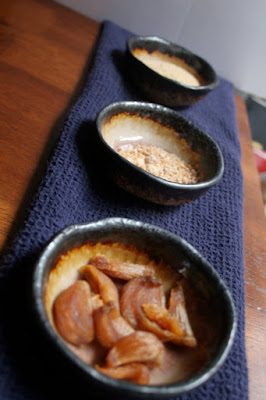The Molecular Gastronomy Nomenclature Debate
Molecular Gastronomy often refers to a form of modern cuisine characterized by use of newer ingredients, techniques and equipment. Many industry folks really dislike the name, preferring Technoemotional, Spanish Avante Garde, Modernism or more truthfully, not being labelled at all. Dave Arnold sums up the reasons for this, but I will condense it for you here:
This BIiF is such a sucking chest wound, that I am finding myself (like the flesh eating virus) sucked in to offering a counter-argument. Not because I disagree, but cause I am disagreeable. While the term can be totally Offputting, let's look at the 2009 S. Pellegrino List of 50 Best Restaurants:
With regards to being Too Encompassing, I think that, to the average diner, one could make an argument that Wylie and Grant's cuisines are more similar than different. One of the reasons I think that it gets Inconsistently Applied is because most of the 4 star restaurants that use these techniques already have a label, most likely of a regional origin. Which leaves us with Inaccurate, where I really don't have a counter point other than to say that sometimes the wrong word sticks. There is certainly precedent for that.
Every time I hear the "Don't call it Molecular Gastronomy", I am immediately reminded of every awkward occasion a friend has tried to describe a relationship to me where they don't call someone their girlfriend because they don't like labels. I don't know, maybe real money is lost because people won't go to a place that has been labelled Molecular Gastronomy. But I think it's avoiding the core issue. A lot people find new things scary. The person that doesn't find Methyl Cellulose or Transglutaminase appealing, doesn't want to eat it at an "Molecular Gastronomy" restaurant, a "technoemotional" restaurant, a 4 star restaurant or even McDonalds.
Don't get me wrong, I try hard not to call it Molecular Gastronomy (usually opting for "Modernism") because I respect the people that don't like the term, but it feels like a tempest (*) in a tea-cup.
(*) notice how I didn't do something cliche like say tempest-foam (***) or a tea-cup fashioned entirely out of tempest.(**)
(**) i should lose all credit for bringing it to your attention
(***) just by conjuring up the word foam, I defeat my own argument
- Offputting. Molecular gastronomy does not sound delicious. I think this is also why most chefs that find themselves in this bucket don't want it to apply to them. Out of all the reasons, this one is of particular concern. The term discourages people from trying the food, as it sounds like food with chemical additives and that's scary.
- Too encompassing. Many of the chefs that fall into this bucket. Dave's example is comparing WD~50 and Alinea. Which I actually think is a bad (or good) example, because the average diner is not going to be nuanced enough to understand the different approaches Grant and Wylie have.
- And yet at the same time, inconsistently applied. Most of the techniques used by restaurants described as MG, are also found in many 4 star restaurants in NYC.
- Inaccurate. Molecular Gastronomy as a term to explain cooking is nonsensical.
This BIiF is such a sucking chest wound, that I am finding myself (like the flesh eating virus) sucked in to offering a counter-argument. Not because I disagree, but cause I am disagreeable. While the term can be totally Offputting, let's look at the 2009 S. Pellegrino List of 50 Best Restaurants:
- El Bulli, Roses, Spain
- The Fat Duck, Bray-on-Thames, UK
- Noma, Copenhagen, Denmark (Chef's Choice)
- Mugaritz, San Sebastián, Spain
- El Celler de Can Roca, Girona, Spain
- per se, New York, US
- Bras, Laguiole, France
- Arzak, San Sebastián, Spain
- Pierre Gagnaire, Paris, France
- Alinea, Chicago, US
With regards to being Too Encompassing, I think that, to the average diner, one could make an argument that Wylie and Grant's cuisines are more similar than different. One of the reasons I think that it gets Inconsistently Applied is because most of the 4 star restaurants that use these techniques already have a label, most likely of a regional origin. Which leaves us with Inaccurate, where I really don't have a counter point other than to say that sometimes the wrong word sticks. There is certainly precedent for that.
Every time I hear the "Don't call it Molecular Gastronomy", I am immediately reminded of every awkward occasion a friend has tried to describe a relationship to me where they don't call someone their girlfriend because they don't like labels. I don't know, maybe real money is lost because people won't go to a place that has been labelled Molecular Gastronomy. But I think it's avoiding the core issue. A lot people find new things scary. The person that doesn't find Methyl Cellulose or Transglutaminase appealing, doesn't want to eat it at an "Molecular Gastronomy" restaurant, a "technoemotional" restaurant, a 4 star restaurant or even McDonalds.
Don't get me wrong, I try hard not to call it Molecular Gastronomy (usually opting for "Modernism") because I respect the people that don't like the term, but it feels like a tempest (*) in a tea-cup.
(*) notice how I didn't do something cliche like say tempest-foam (***) or a tea-cup fashioned entirely out of tempest.(**)
(**) i should lose all credit for bringing it to your attention
(***) just by conjuring up the word foam, I defeat my own argument



[...] More here: The Molecular Gastronomy Nomenclature Debate « Medellitin [...]
ReplyDelete